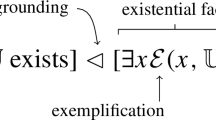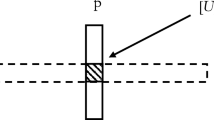Abstract
I provide an argument against the Aristotelian view of universals, according to which universals depend for their existence on their exemplifiers. The argument consists in a set of five jointly inconsistent assumptions. As such, the argument can be used to argue in favour of other conclusions, such as that exemplification is no relation or that plausible principles concerning ontological dependence or grounding do not hold.
Similar content being viewed by others
Notes
For recent discussion about the relationship between grounding and dependence, see Schnieder (2017).
The principle that relations are grounded in their relata should be clearly distinguished from the principle that relations are existence entailing: if aRb, then both a and b exist.
Brackets are here introduced for ease of reading.
For example, Mulligan (2006) holds that (This chair exemplifies redness) is grounded in (This chair is red).
Thanks to an anonymous referee for making this point.
References
Azzouni, J. (2012). Simple metaphysics and “ontological dependence”. In F. Correia & B. Schnieder (Eds.), Metaphysical grounding: Understanding the structure of reality (pp. 234–253). Cambridge: Cambridge University Press.
Bennett, K. (2011). By our bootstraps. Philosophical Perspectives, 25, 27–41.
Bliss, R. (2018). Grounding and reflexivity. In R. Bliss & G. Priest (Eds.), Reality and its structure: Essays in fundamentality. New York: Oxford University Press.
Bolzano, B. (1810). Beiträge zu einer begründeteren Darstellung der Mathematik. Prag: Caspar Widtmann.
Cameron, R. (2008). Turtles all the way down: Regress, priority, and fundamentality. The Philosophical Quarterly, 58, 1–14.
Cameron, R. (2014). Parts generate the whole but are not identical to it. In A. Cotnoir & D. Baxter (Eds.), Composition as identity (pp. 90–110). New York: Oxford University Press.
Correia, F. (2005). Existential dependence and cognate notions. Munich: Philosophia Verlag.
Correia, F. (2010). Grounding and truth-functions. Logique et Analyse, 53, 251–279.
Fine, K. (1982a). Dependent objects. Unpublished Manuscript.
Fine, K. (1982b). Fine-order modal theories III: Facts. Synthese, 53(1), 43–122.
Fine, K. (2009). The question of ontology. In D. Chalmers, et al. (Eds.). Metametaphysics (pp. 157–177). Oxford: Oxford University Press.
Fine, K. (2010). Some puzzles of ground. Notre Dame Journal of Formal Logic, 51, 97–118.
Fine, K. (2012). Guide to ground. In F. Correia & B. Schnieder (Eds.), Metaphysical grounding: Understanding the structure of reality (pp. 37–80). Cambridge: Cambridge University Press.
Frege, G. (1891). Funktion un Begriff. Jena.
Koslicki, K. (2012). Varieties of ontological dependence. In F. Correia & B. Schnieder (Eds.), Metaphysical grounding: Understanding the structure of reality (pp. 186–213). Cambridge: Cambridge University Press.
Krämer, S. (2013). A simpler puzzle of ground. Thought, 2, 85–89.
Leuenberger, S. The fundamental—Ungrounded or all-grounding? Unpublished manuscript.
Litland, J. (2013). On some counterexamples to the transitivity of grounding. Essays in Philosophy, 14, 19–32.
Lowe, E. J. (1998). The possibility of metaphysics. Oxford: Oxford University Press.
Lowe, E. J. (2006). The four-category ontology. Oxford: Oxford University Press.
Mulligan, K. (2006). Ascent, propositions and other formal objects. Grazer Philosophische Studien, 72, 29–48.
Orilia, F. (2016). Properties. In E. N. Zalta (Ed.), The Stanford Encyclopedia of Philosophy. https://plato.stanford.edu/archives/win2016/entries/states-of-affairs/.
Rayo, A. (2017). The world is the totality of facts, not of things. Philosophical Issues, 27(1), 250–278.
Rosen, G. (2009). Metaphysical dependence: Grounding and reduction. In B. Hale, & A. Hoffmann (Eds.), Modality: Metaphysics, logic, and epistemology (pp. 109–236). Oxford: Oxford University Press.
Russell, B. (1899). Review of Alexius Meinong. Über die Bedeutung des Weberschen Gesetzes. Mind, 8, 251–256.
Rydéhn, H. (2018). Grounding and ontological dependence. Synthese. https://doi.org/10.1007/s11229-018-1818-4
Schaffer, J. (2009). On what grounds what. In D. Chalmers, et al. (Eds.), Metametaphysics (pp. 347–383). Oxford: OUP.
Schaffer, J. (2012). Grounding, transitivity and contrastivity. In F. Correia & B. Schnieder (Eds.), Metaphysical grounding: Understanding the structure of reality (pp. 122–138). Cambridge: Cambridge University Press.
Schnieder, B. (2004). Substanzen und (ihre) Eigenschaften. Berlin: de Gruyter.
Schnieder, B. (2006). A certain kind of trinity: Dependence, substance, explanation. Philosophical Studies, 129, 393–419.
Schnieder, B. (2011). A logic for “because”. Review of Symbolic Logic, 4, 445–465.
Schnieder, B. (2017). Grounding and dependence. Synthese. https://doi.org/10.1007/s11229-017-1378-z.
Skiles, A. (2015). Against grounding Necessitarianism. Erkenntnis, 80, 717–751.
Strawson, P. (1959). Individuals: An essay in descriptive metaphysics. Garden City, NY: Doubleday.
Textor, M. (2012). States of affairs. In E. N. Zalta (Ed.), The Stanford Encyclopedia of Philosophy. https://plato.stanford.edu/archives/win2016/entries/states-of-affairs/.
Vallicella, W. (2002). Relations, monism, and the vindication of Bradley’s regress. Dialectica, 56, 3–35.
Wittgenstein, L. (1922). Tractatus logico-philosophicus. London: Kegan Paul.
Acknowledgements
I am grateful to Franz Berto, Fabrice Correia, Anna Marmodoro, Kevin Mulligan, Paolo Natali, Francesco Orilia, Jan Plate, Thomas Sattig, Jonathan Schaffer, Benjamin Schnieder, Alex Skiles, Alberto Tassoni, and three anonymous referees for helpful comments.
Author information
Authors and Affiliations
Corresponding author
Additional information
Publisher's Note
Springer Nature remains neutral with regard to jurisdictional claims in published maps and institutional affiliations.
Rights and permissions
About this article
Cite this article
Costa, D. An argument against Aristotelian universals. Synthese 198, 4331–4338 (2021). https://doi.org/10.1007/s11229-019-02345-z
Received:
Accepted:
Published:
Issue Date:
DOI: https://doi.org/10.1007/s11229-019-02345-z




